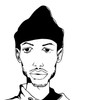'Juliana' (2015), by Frank Benson. Courtesy the artist; Andrew Kreps Gallery, New York; and Sadie Coles HQ London
Huxtable is no stranger to these struggles. In fact, they define her and have had an essential impact on her art. Born intersex and assigned to the male gender, the artist was raised in a conservative Baptist home in College Station, Texas, in the 1990s. Back then, Huxtable identified as a boy and went by the name Julian Letton. Her mother, Kassandra, worked as a college administrator at Texas A&M and her father was an engineering professor at the local college."My childhood was very Christian and very Texan," she says. From the outside, it seemed like a typical American middle-class upbringing. Her parents were married. She had two siblings, sang in the church choir, played club soccer, and dreamed of being a poet and painter.It wasn't until the fifth grade that her idyllic life started to break down. Huxtable started getting bullied because she was often the only black student in her school. Kids would call her the N-word, and her parents once had to pull her out of an American Civil War school play because she was given the role of a Confederate soldier. "I always kept a writing journal and a drawing journal," says Huxtable. "And when I look back at my watercolors and paintings from that period, that's when they got really dark."Huxtable's parents divorced, and her father moved to Alabama to teach at the Tuskegee Institute, leaving her mother alone to raise Huxtable and her two siblings. "I was experiencing a lot of physical abuse at home that I internalized as normal. I would go home and my mom was in a dark place, and she took that out on me.""I felt that the only option I had was either to be a freak or a weird boy."
Photo by Job Piston, makeup by Amanda Wilson, and dress by Eckhaus Latta
The shame she experienced in her hometown followed her to Bard College in upstate New York, where she wore a chest binder. But she managed to find an outlet. "I was fully brainwashed by the Bible Belt shit," she says, "but the internet became a form of solitude. It gave me a sense of control and freedom that I didn't have in my everyday life, because I walked through life feeling hated, embarrassed, trapped, and powerless. I felt very suicidal.""Juliana's voice is integral in this time, because she truly is a beacon of hope. She exists at the crux of almost every type of intersectionality, but still thrives."
Photo by Job Piston, makeup by Amanda Wilson, and dress by Eckhaus Latta
' Untitled in the Rage (Nibiru Cataclysm)' (2015) from the 'Universal Crop Tops for All the Self Canonized Saints of Becoming' series, by Juliana Huxtable. Courtesy the artist
